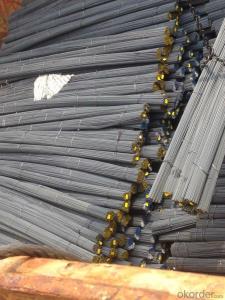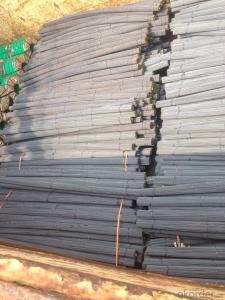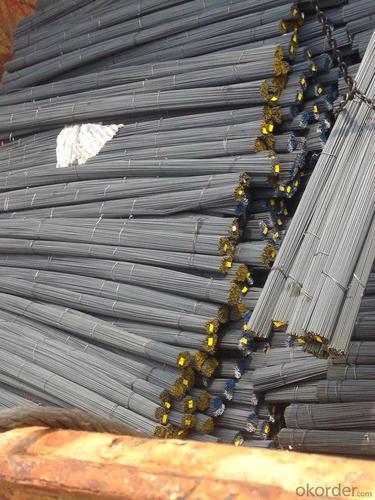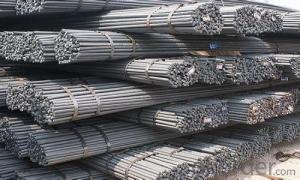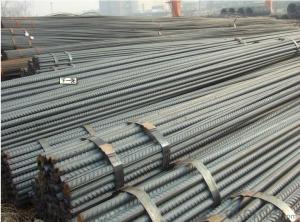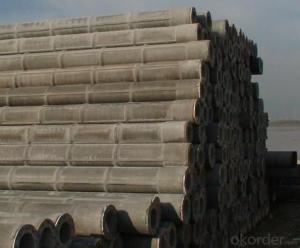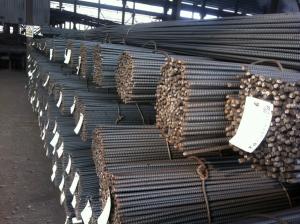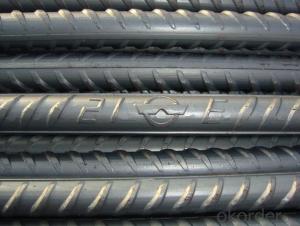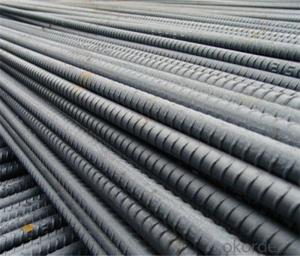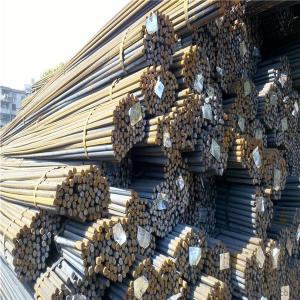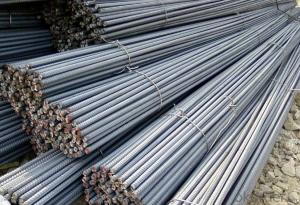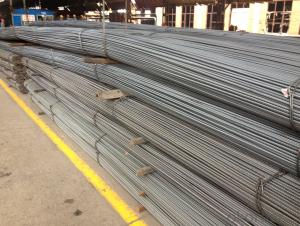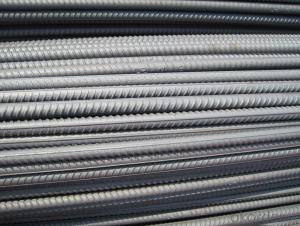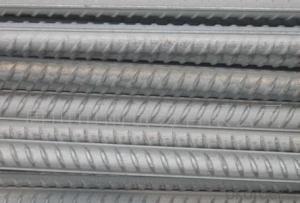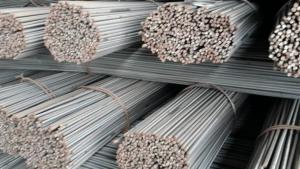Deformed Steel Bar for Construction, High Quality Deformed Bar
- Loading Port:
- Tianjin
- Payment Terms:
- TT OR LC
- Min Order Qty:
- 50 m.t.
- Supply Capability:
- 200000 m.t./month
OKorder Service Pledge
OKorder Financial Service
You Might Also Like
Specification
Product Description of Deformed Steel Bar for Construction, High Quality Deformed Bar:
OKorder is offering Deformed Steel Bar for Construction, High Quality Deformed Bar great prices with worldwide shipping. Our supplier is a world-class manufacturer of steel, with our products utilized the world over. OKorder annually supplies products to European, North American and Asian markets. We provide quotations within 24 hours of receiving an inquiry and guarantee competitive prices.
Product Applications of Deformed Steel Bar for Construction, High Quality Deformed Bar:
Deformed Steel Bar for Construction, High Quality Deformed Bar are ideal for structural applications and are widely used in the construction of buildings and bridges, and the manufacturing, petrochemical, and transportation industries.
Product Advantages of Deformed Steel Bar for Construction, High Quality Deformed Bar:
OKorder's Deformed Steel Bar for Construction, High Quality Deformed Bar are durable, strong, and resist corrosion.
Main Product Features of Deformed Steel Bar for Construction, High Quality Deformed Bar:
· Premium quality
· Prompt delivery & seaworthy packing (30 days after receiving deposit)
· Corrosion resistance
· Can be recycled and reused
· Mill test certification
· Professional Service
· Competitive pricing
Product Specifications of Deformed Steel Bar for Construction, High Quality Deformed Bar:
Standard | GB | HRB400 | |
Diameter | 6mm,8mm,10mm,12mm,14mm,16mm,18mm,20mm, 22mm,25mm,28mm,32mm,36mm,40mm,50mm | ||
Length | 6M, 9M,12M or as required | ||
Place of origin | Hebei, China mainland | ||
Advantages | exact size, regular package, chemical and mechanical properties are stable. | ||
Type | Hot rolled deformed steel bar | ||
Brand name | DRAGON | ||
Chemical Composition: (Please kindly find our chemistry of our material based on HRB500 as below for your information)
Grade | Technical data of the original chemical composition (%) | ||||||
C | Mn | Si | S | P | V | ||
HRB400 | ≤0.25 | ≤1.60 | ≤0.80 | ≤0.045 | ≤0.045 | 0.04-0.12 | |
Physical capability | |||||||
Yield Strength (N/cm²) | Tensile Strength (N/cm²) | Elongation (%) | |||||
≥400 | ≥570 | ≥14 | |||||
Theoretical weight and section area of each diameter as below for your information:
Diameter(mm) | Section area (mm²) | Mass(kg/m) | Weight of 12m bar(kg) |
6 | 28.27 | 0.222 | 2.664 |
8 | 50.27 | 0.395 | 4.74 |
10 | 78.54 | 0.617 | 7.404 |
12 | 113.1 | 0.888 | 10.656 |
14 | 153.9 | 1.21 | 14.52 |
16 | 201.1 | 1.58 | 18.96 |
18 | 254.5 | 2.00 | 24 |
20 | 314.2 | 2.47 | 29.64 |
22 | 380.1 | 2.98 | 35.76 |
25 | 490.9 | 3.85 | 46.2 |
28 | 615.8 | 4.83 | 57.96 |
32 | 804.2 | 6.31 | 75.72 |
36 | 1018 | 7.99 | 98.88 |
40 | 1257 | 9.87 | 118.44 |
50 | 1964 | 15.42 | 185.04 |
Usage and Applications of Deformed Steel Bar for Construction, High Quality Deformed Bar:
Deformed bar is widely used in buildings, bridges, roads and other engineering construction. Big to highways, railways, bridges, culverts, tunnels, public facilities such as flood control, dam, small to housing construction, beam, column, wall and the foundation of the plate, deformed bar is an integral structure material. With the development of world economy and the vigorous development of infrastructure construction, real estate, the demand for deformed bar will be larger and larger..
Packaging & Delivery of Deformed Steel Bar for Construction, High Quality Deformed Bar:
Packaging Detail: products are packed in bundle and then shipped by container or bulk vessel, deformed bar is usually naked strapping delivery, when storing, please pay attention to moisture proof. The performance of rust will produce adverse effect.
Each bundle weight: 2-3MT, or as required
Payment term: TT or L/C
Delivery Detail: within 45 days after received advanced payment or LC.
Label: to be specified by customer, generally, each bundle has 1-2 labels
Trade terms: FOB, CFR, CIF
Images of Deformed Steel Bar for Construction, High Quality Deformed Bar:
I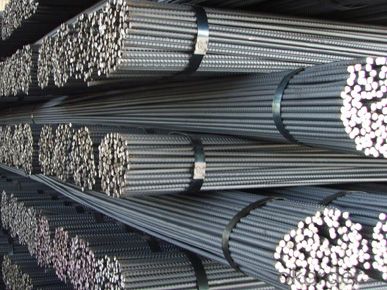
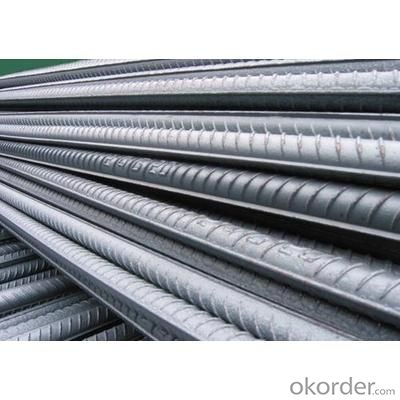
Note:
1. Our products are produced according to national standard (GB), if not, supply according to national standards (GB) or agreement as customer required.
2. Other Grade and Standard Deformed Steel Bar we can supply:
Grade: GR40/GR60, G460B/B500A/B500B/B500C,BST500S
Standard: ASTM, BS, DIN
The Minimum Order Quantity of these products is high, and need to be confirmed.
3. We can not only supply Deformed Steel Bar; if you need anything about building materials, please contact us for further information.
4. Please send us your detail specifications when inquire. We will reply to you as soon as possible. We sincerely hope we can establish a long stable business relationship.
FAQ:
Are you a trading company or manufacturer? | Manufacturer |
What’s the MOQ? | 3 metric ton |
What’s your delivery time? | 15-35 days after downpayment received |
Do you Accept OEM service? | Yes |
what’s your delivery terms? | FOB/CFR/CIF |
What's the Payment Terms? | 30% as deposit,70% before shipment by T/T |
Western Union acceptable for small amount. | |
L/C acceptable for large amount. | |
Scrow ,Paybal,Alipay are also ok | |
Why choose us? | Chose happens because of quality, then price, We can give you both. Additionally, we can also offer professional products inquiry, products knowledge train (for agents), smooth goods delivery, excellent customer solution proposals. |
What's your available port of Shipment? | Main Port, China |
What’s your featured services? | Our service formula: good quality+ good price+ good service=customer's trust
|
Where are your Market? | Covering more than 160 countries in the world |
- Q: What is the role of steel rebars in the construction of wastewater treatment plants?
- Steel rebars play a crucial role in the construction of wastewater treatment plants as they provide structural reinforcement to the concrete used in the plant's foundations, walls, and other structural components. This reinforcement ensures the structural integrity of the plant, enabling it to withstand the heavy loads and harsh environmental conditions associated with wastewater treatment operations. Additionally, steel rebars help prevent cracking and improve the overall durability and longevity of the wastewater treatment plant.
- Q: Are steel rebars corrosion-resistant?
- Yes, steel rebars are corrosion-resistant.
- Q: How do steel rebars contribute to the structural stability of a building?
- Steel rebars contribute to the structural stability of a building by providing reinforcement and increasing the tensile strength of concrete. By being embedded within the concrete, rebars help to distribute the load evenly throughout the structure, enhancing its resistance to bending, cracking, and other types of structural failures. Overall, steel rebars add significant strength and durability to the building, ensuring its ability to withstand various forces and maintain its stability over time.
- Q: What is the difference between steel rebars and FRP rebars?
- Construction projects use steel rebars and FRP rebars as reinforcement materials, but they differ in composition and mechanical properties. Steel rebars, made of carbon steel, are known for their strength and durability, making them a reliable choice for reinforcing concrete structures. On the other hand, FRP rebars are composed of fibers embedded in a polymer matrix, such as glass or carbon. This composite material offers advantages over steel rebars. Firstly, FRP rebars are lighter, making them easier to handle and transport, reducing labor and equipment costs. Secondly, FRP rebars do not corrode, unlike steel rebars. Steel rebars are prone to corrosion when exposed to moisture and chemicals, weakening the structure over time. FRP rebars, however, are resistant to rust and corrosion, making them ideal for environments with high humidity, saltwater, or chemical exposure. Additionally, FRP rebars have a high resistance to electromagnetic fields, making them suitable for sensitive areas like hospitals, power plants, or telecommunication facilities, where minimizing electromagnetic interference is crucial. However, FRP rebars have lower tensile strength compared to steel rebars, making them less suitable for heavy-load-bearing structures. Moreover, FRP rebars initially cost more than steel rebars, but their long-term durability and reduced maintenance requirements can offset this expense. In conclusion, the differences between steel rebars and FRP rebars lie in their composition, mechanical properties, and performance in various environmental conditions. Steel rebars offer high tensile strength but are susceptible to corrosion, while FRP rebars are lighter, non-corrosive, and have a high resistance to electromagnetic fields. The choice between the two depends on project requirements, load-bearing needs, and environmental factors.
- Q: Are there any environmental benefits to using steel rebars?
- There are numerous environmental advantages to utilizing steel rebars in construction. Here are some of the main benefits: 1. Recyclability: Steel rebars possess a high degree of recyclability, enabling them to be reused or repurposed once their lifespan in a structure comes to an end. This diminishes the need for new steel production and the associated energy consumption and greenhouse gas emissions. In fact, steel is one of the most widely recycled materials worldwide, boasting a recycling rate of approximately 90%. 2. Durability: Steel rebars are renowned for their strength and durability, granting structures a longer lifespan. This lessens the necessity for frequent replacements or repairs, resulting in reduced waste generation and the conservation of resources. 3. Energy efficiency: Steel production has become increasingly energy-efficient over time, thanks to advancements in technology and processes. This signifies that the environmental impact of steel production has been decreasing, making it a more sustainable choice in comparison to other materials. 4. Reduced deforestation: Steel rebars provide an alternative to timber reinforcement, which is often acquired through deforestation practices. By opting for steel rebars instead, we can help alleviate the pressure on forests and safeguard their invaluable ecosystem services. 5. Waste reduction: Steel rebars can be prefabricated and cut to precise lengths, minimizing waste on construction sites. Additionally, the scrap generated during the fabrication process can be recycled, further reducing waste generation. In conclusion, the utilization of steel rebars in construction offers a variety of environmental benefits, including recyclability, durability, energy efficiency, reduced deforestation, and waste reduction. These advantages contribute to a more sustainable and eco-friendly construction industry.
- Q: Can steel rebars be used in retaining walls?
- Yes, steel rebars can be used in retaining walls. Steel rebars are commonly used in the construction of retaining walls to provide reinforcement and increase the structural integrity of the wall. They help to prevent cracking and ensure the wall can withstand lateral pressure from the retained soil or other materials.
- Q: What is the role of steel rebars in increasing the load-carrying capacity of a structure?
- The role of steel rebars in increasing the load-carrying capacity of a structure is to provide reinforcement and strength to the concrete. The rebars act as tension members, resisting the tensile forces that the concrete alone cannot handle effectively. By adding steel rebars to the structure, it becomes more resistant to bending, cracking, and failure under heavy loads. The rebars distribute the applied load across a larger area, enhancing the overall structural integrity and allowing for greater load-carrying capacity.
- Q: What are the guidelines for proper handling and disposal of steel rebars on construction sites?
- The guidelines for proper handling and disposal of steel rebars on construction sites are as follows: 1. Handling: - Wear appropriate personal protective equipment (PPE) such as gloves and safety glasses when handling steel rebars. - Lift and carry rebars properly using your legs and not your back to prevent injuries. - Do not throw or drop rebars as this can cause damage to the surrounding area and potentially harm workers. 2. Storage: - Store rebars in a designated area that is easily accessible and away from traffic or other hazards. - Stack rebars vertically to prevent them from rolling or falling. - Use racks or shelves to organize rebars and prevent them from getting tangled or damaged. 3. Disposal: - Rebars that are damaged or have reached the end of their usable life should be disposed of properly. - Contact local waste management authorities to determine the specific disposal requirements for steel rebars in your area. - If recycling is available, consider sending the rebars to a recycling facility to reduce waste and promote sustainability. - Do not dispose of steel rebars in regular trash bins or open areas, as they can pose a safety hazard. 4. Transportation: - When moving rebars within the construction site or transporting them to another location, secure them properly to prevent them from falling off the vehicle or causing damage. - Use appropriate vehicles such as trucks or trailers with sufficient tie-down points to ensure proper transportation. 5. Training and Communication: - Ensure that all workers involved in handling and disposal of steel rebars are properly trained on the guidelines and safety procedures. - Clearly communicate the guidelines to all workers, including subcontractors or temporary workers, to ensure consistent adherence to the rules. - Regularly review and update the guidelines as necessary to address any evolving safety concerns or regulatory changes. By following these guidelines, construction sites can promote a safe and organized working environment while ensuring proper handling and disposal of steel rebars.
- Q: How do steel rebars affect the thermal conductivity of concrete structures?
- Steel rebars have a significant impact on the thermal conductivity of concrete structures. The inclusion of steel rebars in concrete increases the overall thermal conductivity of the structure. This is because steel has a much higher thermal conductivity than concrete. Consequently, heat transfer through the concrete is facilitated by the presence of steel rebars, leading to a higher overall thermal conductivity of the structure.
- Q: How are steel rebars used in the construction of dams?
- Steel rebars are used in the construction of dams to reinforce the concrete structure and provide additional strength and durability. They are typically placed within the concrete to resist tensile forces and prevent cracking or collapsing under the immense pressure of water. The rebars help to distribute the load evenly across the dam, increasing its overall stability and ensuring its long-term structural integrity.
Send your message to us
Deformed Steel Bar for Construction, High Quality Deformed Bar
- Loading Port:
- Tianjin
- Payment Terms:
- TT OR LC
- Min Order Qty:
- 50 m.t.
- Supply Capability:
- 200000 m.t./month
OKorder Service Pledge
OKorder Financial Service
Similar products
Hot products
Hot Searches
Related keywords
